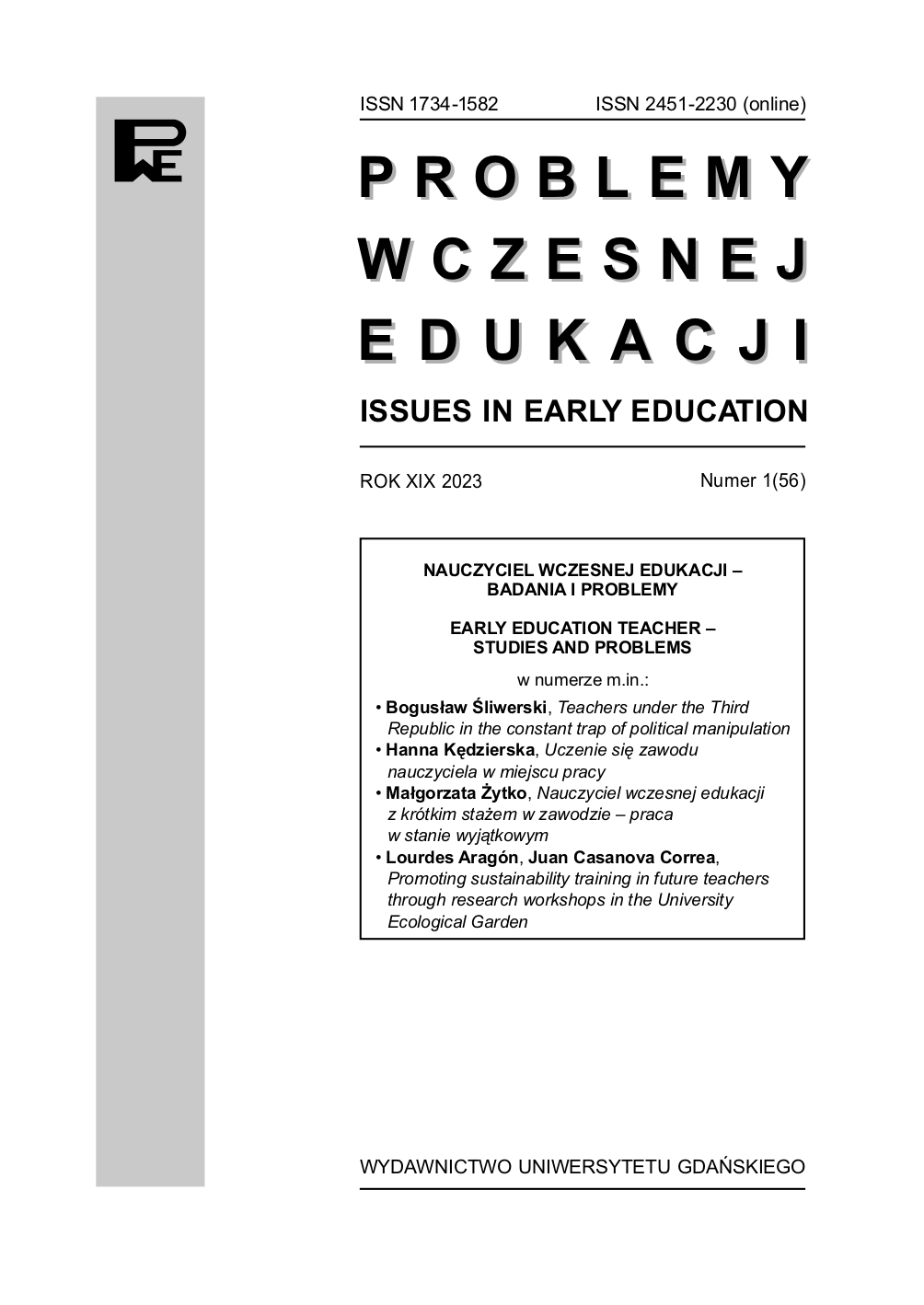Nauczyciel wczesnej edukacji z krótkim stażem w zawodzie – praca w stanie wyjątkowym
DOI:
https://doi.org/10.26881/pwe.2023.56.03Słowa kluczowe:
nauczyciel, prestiż społeczny, uznanie, zawód, edukacjaAbstrakt
This article addresses the issue of prestige and social recognition in the teaching profession with up to years of short seniority. The challenge that teachers face on a daily basis is to function in a context of high social expectations and demands, while at the same time, the social prestige of the profession is declining and its value is being depreciated. Appreciation of the profession is closely linked to perceiving and respecting the importance of education in personal, social, and political terms. This issue became the subject of a study carried out in 2021 among a group of more than 800 primary and pre-school teachers in Warsaw, with work experience of not more than 5 years. The aim of the survey was to describe the factors that give satisfaction, motivate, or demotivate teachers to work, with a particular focus on the sense of recognition and social prestige. The results indicate that half the teachers surveyed were considering leaving school and changing professions.
Downloads
Bibliografia
CBOS (2019), Które zawody poważamy? „CBOS. Komunikat z Badań”, 157.
Dobkowska J., Zielińska A., Żytko M. (2023), Młodzi nauczyciele odchodzą ze szkoły. Raport z diagnozy uwarunkowań odchodzenia z zawodu nauczycieli o stażu pracy do 5 lat (w druku).
Domański H. (2012), Prestiż. Toruń, Wydawnictwo Naukowe Uniwersytetu Mikołaja Kopernika.
Domański H. (2019), Stratyfikacyjne funkcje prestiżu. „Przegląd Socjologiczny”, 68(2).
Federowicz M., Choińska-Mika J., Walczak D. (red.) (2014), Liczą się nauczyciele. Raport o stanie edukacji 2013. Warszawa, IBE.
Hargreaves L. (2009), The status and prestige of teachers and teaching. W: L. Saha, G. Dworkin (eds.), The Springer International Handbook of Research on Teachers and Teaching. New York, Springer.
Hernik K. (red.) (2015), Polscy nauczyciele i dyrektorzy w Międzynarodowym Badaniu Nauczania i Uczenia się TALIS 2013. Warszawa, IBE.
Klus-Stańska D. (2010), Dydaktyka wobec chaosu pojęć i zdarzeń. Warszawa, Wydawnictwo Akademickie Żak.
Monteiro A.R. (2015), The teaching profession: Present and future. Dordrecht, Springer.
Nowak-Dziemianowicz M. (2020), Szkoła jako przestrzeń uznania. Warszawa, Wydawnictwo Naukowe PWN.
Pokropek A. (2008), Wzory prestiżu zawodów. „Studia Socjologiczne”, 189(2).
Smak M., Walczak D. (2017), The prestige of the teaching profession in the perception of teachers and former teachers. „Edukacja”, 5.
Źródła internetowe
Hargreaves L., Cunningham M., Hansen A., McIntyre D., Olive C. (2006), The status of teachers and the teaching profession in England: Views from inside and outside the profession. https:// www.researchgate.net/publication/329444007_the_status_of_teachers_and_the_teaching_profession_in_eengland_views_from_onside_and_outside_the_profession_Synthesis_Report, 8.05.2023.
Udave J., Carlo A., Valette S. i in. (2014), Study on policy measures to improve the attractiveness of the teaching profession in Europe – Final report. Vol. 1. Luxembourg, Publications Office, European Commission, Directorate-General for Education, Youth, Sport and Culture, https://data. europa.eu/doi/10.2766/40827, 8.05.2023.

 Uniwersyteckie Czasopisma Naukowe
Uniwersyteckie Czasopisma Naukowe





